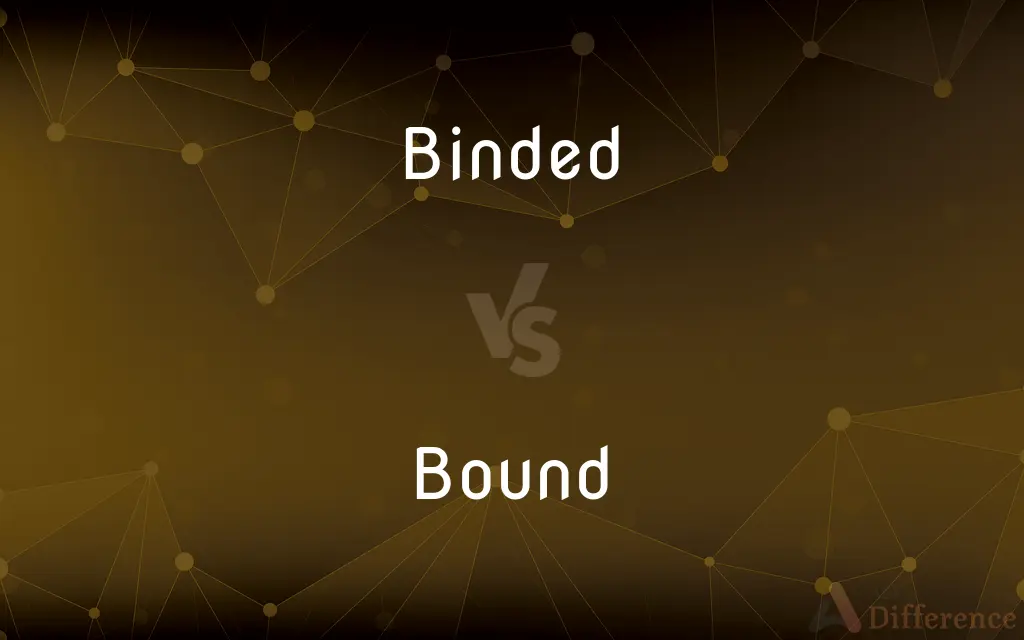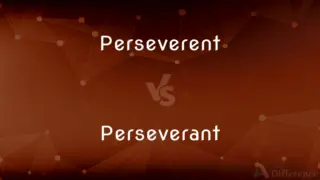Binded vs. Bound — Which is Correct Spelling?
Edited by Tayyaba Rehman — By Fiza Rafique — Updated on March 20, 2024
"Binded" is an incorrect spelling; the correct past tense and past participle of "bind" is "Bound," meaning tied or secured.

Table of Contents
Which is correct: Binded or Bound
How to spell Bound?

Binded
Incorrect Spelling

Bound
Correct Spelling
ADVERTISEMENT
Key Differences
Visualize being "Bound" by ropes, not "Binded."
Practice by pairing: "Bind" goes to "Bound" just as "find" goes to "found."
"Bind" + "ed" does not follow standard conjugation rules, so it becomes "Bound."
Think of "Bound" as a bookbinding, where pages are securely attached.
Remember "Binded" sounds awkward and unnatural when spoken.
ADVERTISEMENT
How Do You Spell Bound Correctly?
Incorrect: The prisoner was binded with handcuffs.
Correct: The prisoner was bound with handcuffs.
Incorrect: The book was binded in leather.
Correct: The book was bound in leather.
Incorrect: They had binded the agreement with a handshake.
Correct: They had bound the agreement with a handshake.
Incorrect: She binded the documents together with a clip.
Correct: She bound the documents together with a clip.
Incorrect: He has binded himself to secrecy.
Correct: He has bound himself to secrecy.
Bound Definitions
A leaping movement upward.
The deer took a sudden bound over the fence.
A limit or boundary.
We have crossed the city's southern bound.
Certain or likely to happen.
He is bound to succeed with such dedication.
Heading toward a destination.
I am London-bound this evening.
Walk or run with leaping strides
Shares bounded ahead in early dealing
Louis came bounding down the stairs
Form the boundary of; enclose
The ground was bounded by a main road on one side and a meadow on the other
Past and past participle of bind
A leaping movement towards or over something
I went up the steps in two effortless bounds
A territorial limit; a boundary
The ancient bounds of the forest
Certain to be or to do or have something
There is bound to be a change of plan
Restricted or confined to a specified place
His job kept him city-bound
(of a book) having a specified binding
Fine leather-bound books
(of a grammatical element) occurring only in combination with another form.
Going or ready to go towards a specified place
An express train bound for Edinburgh
The three moon-bound astronauts
To leap forward or upward; jump; spring
The dog bounded over the gate.
To move forward by leaps or springs
The deer bounded into the woods.
To spring back from a surface; rebound
The basketball bounded off the backboard.
To set a limit to; confine
A high wall that bounded the prison yard.
Lives that were bounded by poverty.
To constitute the boundary or limit of
A city park that was bounded by busy streets.
To identify the boundaries of; demarcate.
To border on another place, state, or country.
Past tense and past participle of bind.
A leap; a jump
The deer was away in a single bound.
A springing back from a surface after hitting it; a bounce
Caught the ball on the bound.
Often bounds A boundary; a limit
Our joy knew no bounds. Your remarks exceed the bounds of reason.
Bounds The territory on, within, or near limiting lines
The bounds of the kingdom.
Confined by bonds; tied
Bound hostages.
Being under legal or moral obligation
Bound by my promise.
Equipped with a cover or binding
Bound volumes.
Predetermined; certain
We're bound to be late.
Determined; resolved
Many public policy students are bound to be politicians one day.
(Linguistics) Being a form, especially a morpheme, that cannot stand as an independent word, such as a prefix or suffix.
Constipated.
Headed or intending to head in a specified direction
Commuters bound for home.
A south-bound train.
Simple past tense and past participle of bind
I bound the splint to my leg.
I had bound the splint with duct tape.
To surround a territory or other geographical entity; to form the boundary of.
France, Portugal, Gibraltar and Andorra bound Spain.
Kansas is bounded by Nebraska on the north, Missouri on the east, Oklahoma on the south and Colorado on the west.
To be the bound of.
(intransitive) To leap, move by jumping.
The rabbit bounded down the lane.
(transitive) To cause to leap.
To bound a horse
To rebound; to bounce.
A rubber ball bounds on the floor
To cause to rebound; to throw so that it will rebound; to bounce.
To bound a ball on the floor
(with infinitive) Obliged (to).
You are not legally bound to reply.
That cannot stand alone as a free word.
Constrained by a quantifier.
(dated) Constipated; costive.
Confined or restricted to a certain place; e.g. railbound.
Unable to move in certain conditions; e.g. snowbound.
(obsolete) Ready, prepared.
Ready to start or go (to); moving in the direction (of).
Which way are you bound?
Is that message bound for me?
(with infinitive) Very likely (to), certain to
They were bound to come into conflict eventually.
A boundary, the border which one must cross in order to enter or leave a territory.
I reached the northern bound of my property, took a deep breath and walked on.
Somewhere within these bounds you may find a buried treasure.
(mathematics) A value which is known to be greater or smaller than a given set of values.
A sizeable jump, great leap.
The deer crossed the stream in a single bound.
A spring from one foot to the other in dancing.
(dated) A bounce; a rebound.
The external or limiting line, either real or imaginary, of any object or space; that which limits or restrains, or within which something is limited or restrained; limit; confine; extent; boundary.
He hath compassed the waters with bounds.
On earth's remotest bounds.
And mete the bounds of hate and love.
A leap; an elastic spring; a jump.
A bound of graceful hardihood.
Rebound; as, the bound of a ball.
Spring from one foot to the other.
To limit; to terminate; to fix the furthest point of extension of; - said of natural or of moral objects; to lie along, or form, a boundary of; to inclose; to circumscribe; to restrain; to confine.
Where full measure only bounds excess.
Phlegethon . . .Whose fiery flood the burning empire bounds.
To name the boundaries of; as, to bound France.
To move with a sudden spring or leap, or with a succession of springs or leaps; as the beast bounded from his den; the herd bounded across the plain.
Before his lord the ready spaniel bounds.
And the waves bound beneath me as a steedThat knows his rider.
To rebound, as an elastic ball.
To make to bound or leap; as, to bound a horse.
To cause to rebound; to throw so that it will rebound; as, to bound a ball on the floor.
Restrained by a hand, rope, chain, fetters, or the like.
Inclosed in a binding or cover; as, a bound volume.
Under legal or moral restraint or obligation.
Constrained or compelled; destined; certain; - followed by the infinitive; as, he is bound to succeed; he is bound to fail.
Resolved; as, I am bound to do it.
Constipated; costive.
Ready or intending to go; on the way toward; going; - with to or for, or with an adverb of motion; as, a ship is bound to Cadiz, or for Cadiz.
A line determining the limits of an area
The line or plane indicating the limit or extent of something
A light springing movement upwards or forwards
Move forward by leaps and bounds;
The horse bounded across the meadow
The child leapt across the puddle
Can you jump over the fence?
Form the boundary of; be contiguous to
Place limits on (extent or access);
Restrict the use of this parking lot
Limit the time you can spend with your friends
Spring back; spring away from an impact;
The rubber ball bounced
These particles do not resile but they unite after they collide
Held with another element, substance or material in chemical or physical union
Confined by bonds;
Bound and gagged hostages
Secured with a cover or binding; often used as a combining form;
Bound volumes
Leather-bound volumes
(usually followed by `to') governed by fate;
Bound to happen
An old house destined to be demolished
He is destined to be famous
Covered or wrapped with a bandage;
The bandaged wound on the back of his head
An injury bound in fresh gauze
Headed or intending to head in a certain direction; often used as a combining form as in `college-bound students';
Children bound for school
A flight destined for New York
Bound by an oath;
A bound official
Bound by contract
Confined in the bowels;
He is bound in the belly
Past tense of bind; tied or fastened securely.
She bound the papers together with a rubber band.
Bound Meaning in a Sentence
Ancient manuscripts were carefully bound by skilled craftsmen.
The old books were bound in leather, giving them a classic look.
Stories of heroes bound by honor captivate many readers.
The agreement bound them to complete silence about the details.
The community was bound together by a strong sense of unity.
They were bound by a common goal to save the endangered species.
Leather-bound books have a special place in many collectors' hearts.
She bound her hair up with a ribbon to keep it out of her face.
He bound the wound with a clean cloth to stop the bleeding.
Bound by duty, the soldiers continued their march.
Bound by tradition, the festival has been celebrated for centuries.
She felt bound by her promise to keep the secret.
The treaty bound the nations to peace after years of conflict.
Students are bound by the rules of the school.
The package was bound tightly with string to keep everything secure.
The wizard bound the magic within a crystal.
Athletes are often bound by strict training regimes.
The trees were bound with lights for the holiday season.
Families are bound by bonds stronger than just blood.
The decision bound them to a course of action they later regretted.
Secrets bound them closer than they had anticipated.
She was bound to her family's business by a sense of responsibility.
The team was bound by a shared vision for success.
The two countries were bound by a mutual defense pact.
He felt bound by the contract he had signed.
Bound Idioms & Phrases
Bound hand and foot
Restrained or hindered, either literally or figuratively.
The hostages were found bound hand and foot.
Bound to happen
Inevitable or certain to occur.
With the team's hard work, success was bound to happen.
Bound by oath
Committed to a promise, usually solemnly and formally.
The knights were bound by oath to protect the kingdom.
Bound for glory
Destined for success or greatness.
With such talent, the young artist was bound for glory.
Bound together
United or linked closely.
The tragedy bound the community together more tightly than ever.
Bound by law
Obligated to follow legal requirements.
The company is bound by law to ensure the safety of its products.
Bound up in
Deeply involved or engrossed in something.
She was bound up in her research and forgot about the time.
Homeward bound
Heading towards home.
After the long trip, they were finally homeward bound.
Bound to secrecy
Obligated to keep something secret.
The members of the committee were bound to secrecy about their deliberations.
Bound by tradition
Following practices that have been handed down from the past.
The festival is bound by tradition, celebrating centuries-old customs.
Bound and determined
Very determined or resolved.
She was bound and determined to finish the marathon.
Bound by a common cause
United or brought together by a shared goal or interest.
The volunteers were bound by a common cause to help those in need.
Bound by contract
Legally obligated to fulfill the terms of a contract.
He was bound by contract to complete the work by the deadline.
Common Curiosities
Why is it called Bound?
The term "Bound" comes from Old English "bindan," meaning to tie or fasten.
What is the root word of Bound?
The root word is the Old English "bindan."
Which vowel is used before Bound?
The vowel "o" is used in "Bound."
Which conjunction is used with Bound?
Any conjunction can be used with "Bound" depending on the context, e.g., "and," "but," "or."
Is Bound a negative or positive word?
Neutral. Its connotation depends on the context.
What is the pronunciation of Bound?
Bound is pronounced as /baʊnd/.
What is the singular form of Bound?
Bound is both singular and plural; its form doesn't change based on number.
Is Bound an adverb?
No, Bound is not an adverb.
What is the verb form of Bound?
The base verb form is "Bind"; "Bound" is the past tense and past participle.
Is Bound a countable noun?
Yes, in the sense of a leap or boundary.
Is the word Bound imperative?
No, Bound is not in the imperative form.
Which preposition is used with Bound?
Various prepositions can be used with "Bound," such as "for" in "bound for a destination."
How do we divide Bound into syllables?
Bound is a one-syllable word and cannot be divided further.
What is another term for Bound?
Another term could be "tied" or "fastened" (verb context).
What is the plural form of Bound?
Bound doesn't change for plural as it's the past tense/participle of "Bind."
Which article is used with Bound?
Depending on context, both "a" and "the" can be used before "Bound."
Is the Bound term a metaphor?
It can be used metaphorically, as in "bound by duty."
Is the word Bound a gerund?
No, Bound is not a gerund.
Is Bound a noun or adjective?
Bound can be both a noun and an adjective, depending on its use.
Is Bound a collective noun?
No, Bound is not a collective noun.
Is the word “Bound” a Direct object or an Indirect object?
As a noun or verb form, "Bound" can be a direct object but not an indirect object.
What is a stressed syllable in Bound?
The entire word "Bound" is stressed, being a one-syllable word.
What part of speech is Bound?
Bound can be a verb, noun, or adjective based on its use.
What is the opposite of Bound?
The opposite could be "unbind" or "loose."
What is the first form of Bound?
The first form is "Bind."
Is Bound an abstract noun?
No, it is a concrete noun when referring to a leap or boundary.
Which determiner is used with Bound?
Any determiner can be used based on context, e.g., "this," "that."
What is the second form of Bound?
The second form is "Bound."
What is the third form of Bound?
The third form is also "Bound."
How is Bound used in a sentence?
Example: The pages of the book were neatly bound together.
Is Bound a vowel or consonant?
The word "Bound" starts with a consonant.
How many syllables are in Bound?
Bound has one syllable.
Share Your Discovery

Previous Comparison
Journies vs. Journeys
Next Comparison
Perseverent vs. PerseverantAuthor Spotlight
Written by
Fiza RafiqueFiza Rafique is a skilled content writer at AskDifference.com, where she meticulously refines and enhances written pieces. Drawing from her vast editorial expertise, Fiza ensures clarity, accuracy, and precision in every article. Passionate about language, she continually seeks to elevate the quality of content for readers worldwide.
Edited by
Tayyaba RehmanTayyaba Rehman is a distinguished writer, currently serving as a primary contributor to askdifference.com. As a researcher in semantics and etymology, Tayyaba's passion for the complexity of languages and their distinctions has found a perfect home on the platform. Tayyaba delves into the intricacies of language, distinguishing between commonly confused words and phrases, thereby providing clarity for readers worldwide.








































